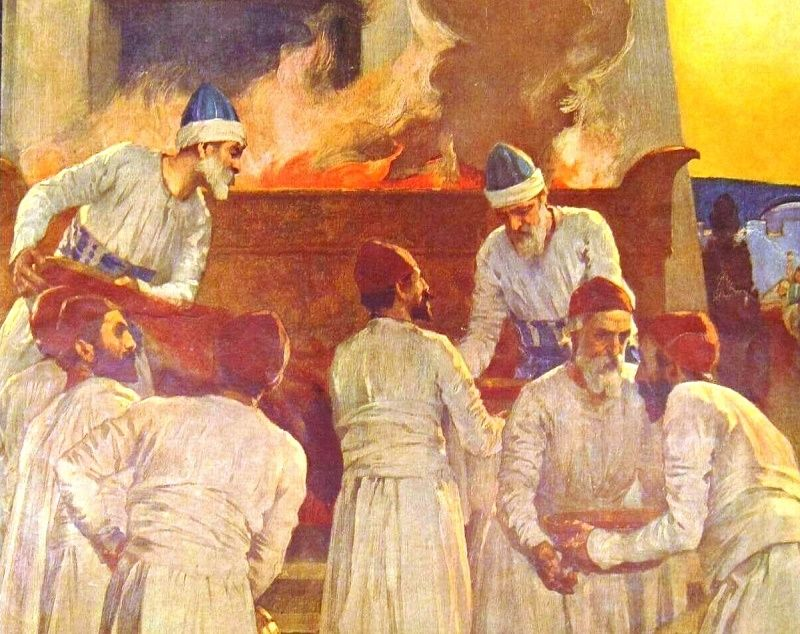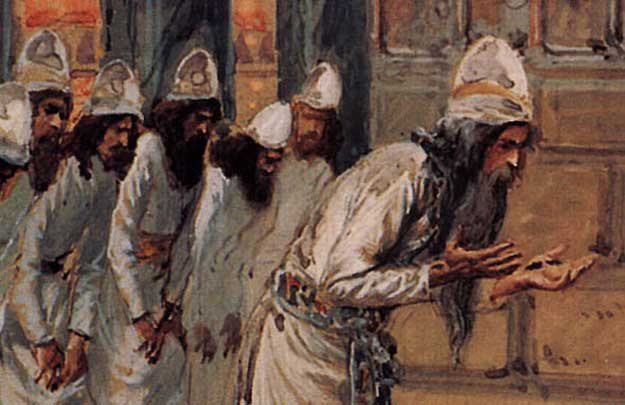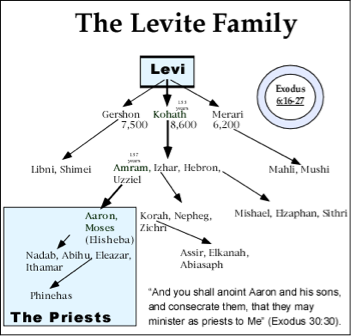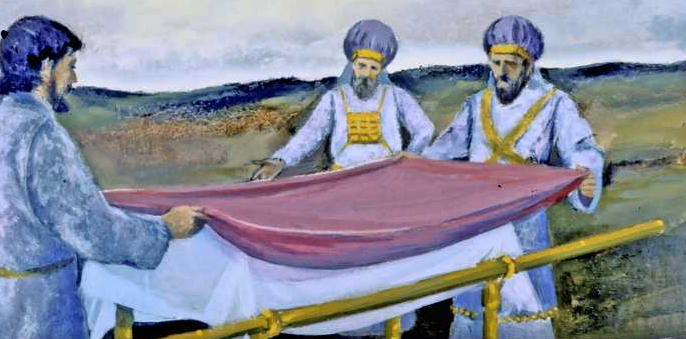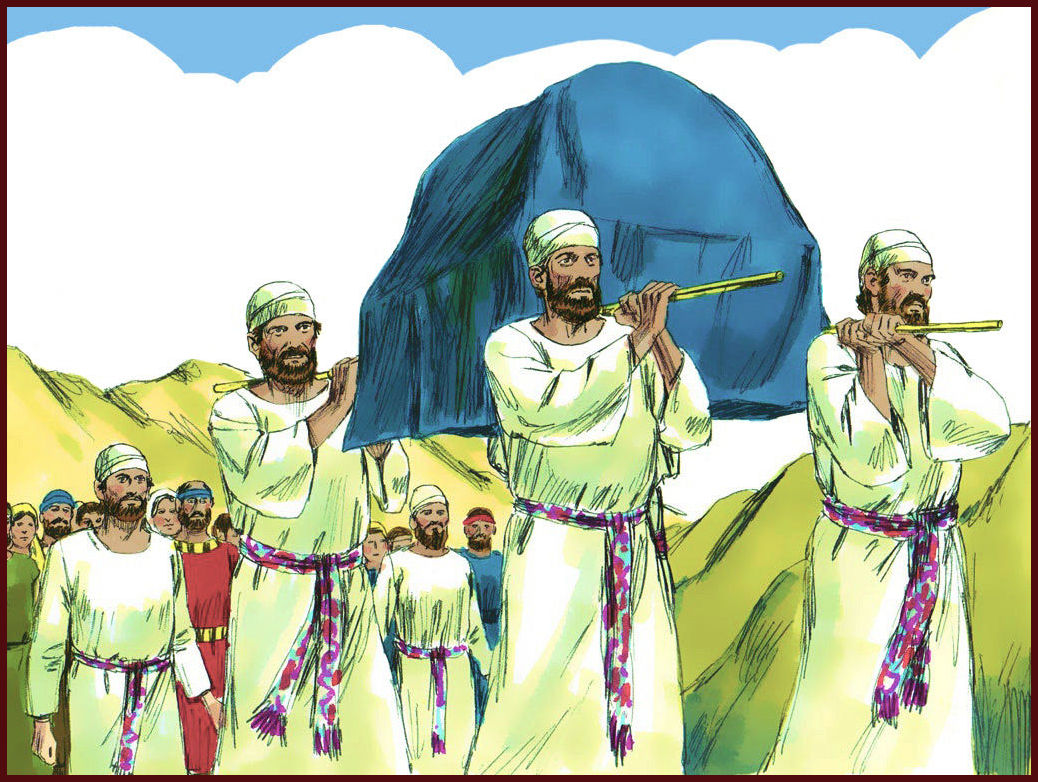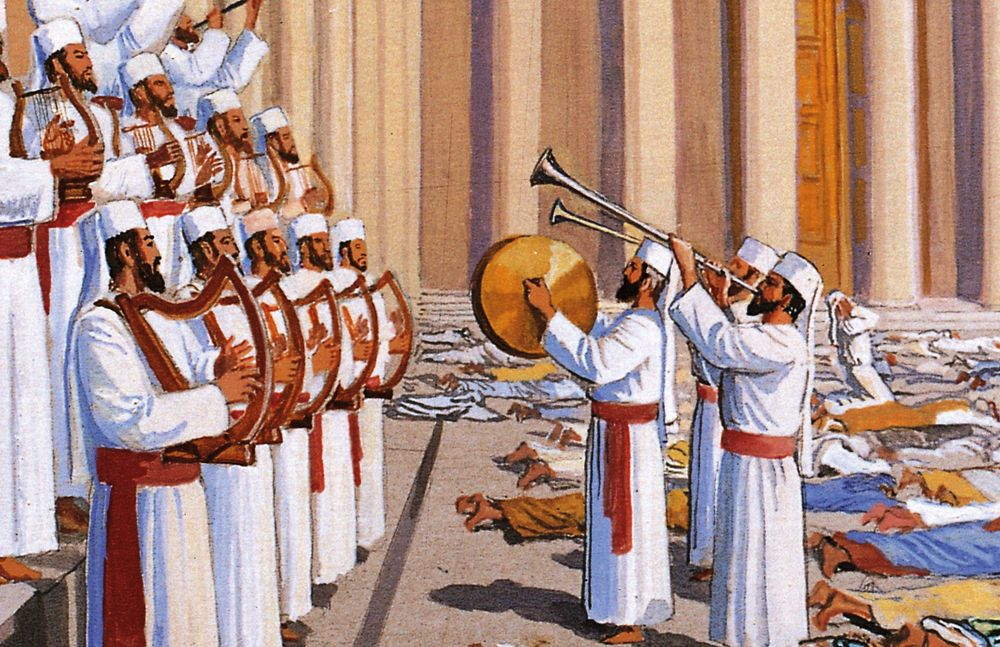Numbers 3: Lessons For Being Part of God’s Holy Priesthood

Image credit1
Introduction: Numbers Chapter three discusses the duties of the Levites, God’s appointed priests. It might be tempting to skip this chapter if you do not wear a white collar and preach on Sundays. Yet, these instructions apply to every believer in Christ. As a believer, you are automatically part of His holy priesthood: “But you are a chosen race, a royal priesthood, a holy nation, a people for God’s own possession, so that you may proclaim the excellencies of Him who has called you out of darkness into His marvelous light;” (1 Pet. 2:9, 5). “[A]nd He has made us to be a kingdom, priests to His God and Father-- to Him be the glory and the dominion forever and ever. Amen.” (Rev. 1:6). As a holy priesthood, you are a co-builder in building God’s Church on Earth: “For we are God’s fellow workers; you are God's field, God’s building.” (1 Cor. 3:9). Thus, you should carefully read the instructions for God’s priests to see how you can best serve Him and help to build His Church.
1. Rule No. 1: Be Obedient to God’s Word. Nu. 3:1-4; Lev. 10:1-3; Ex. 19:22.
There are consequences for being disobedient to God. The beginning three verses of this chapter introduce Aaron’s sons and their deaths while attempting to serve as priests for God: “Now these are the records of the generations of Aaron and Moses at the time when the Lord spoke with Moses on Mount Sinai. 2 These then are the names of the sons of Aaron: Nadab the firstborn, and Abihu, Eleazar and Ithamar. 3 These are the names of the sons of Aaron, the anointed priests, whom he ordained to serve as priests. 4 But Nadab and Abihu died in the presence of the Lord when they offered strange fire before the Lord in the wilderness of Sinai; and they had no children. So Eleazar and Ithamar served as priests in the lifetime of their father Aaron.” (Nu. 3:1-4). Aaron’s sons Nabad and Abihu died for burning “strange fire” that God “had not commanded” (Nu. 3:4; Lev. 10:1-3). They may have deviated from God’s commandments regarding how they were required to prepare the incense (See, Ex. 30:34-38; Lev. 16:1-2). Or they may have been drunk. Although we cannot know for certain, the latter explanation appears to be the most likely one. God’s first words to Aaron following the death of his sons was His instruction that neither he nor his sons drink wine or “strong drink” when entering into the tent of meeting (Lev. 10:8-9). If they had been drunk or impaired, it is possible that Aaron's sons failed to prepare the incense in the correct manner. They may have come at the wrong time. They may have had the wrong motives. They may have failed to show proper reverence in approaching God while under the influence of alcohol. What we do know is that they were irreverent and disobedient in their worship. God’s love will never leave us (Ro. 8:39). Yet, He is also a consuming fire (Heb. 12:28-29). Sin of any kind cannot be in His holy presence. Even if we have been walking with the Lord a long time and even if He has recently blessed us for our obedience, we must never lose sight of the fact that we are sinners, and He is holy (Ps. 14:1; Ro. 3:10). The more we study the Law, the more we understand His holiness and our need for mercy and grace (Ro. 3:20). There are a number of other specific lessons from their deaths.
God disciplines those whom He loves. This was one of only two times in the Bible where God killed someone based upon the way they worshiped Him. Ananias and Sappira’s death following their lies when presenting their tithes is the only other recorded example (Acts 5:1-11). Each time, God killed the person to set an example and send a message. Because Christians live under mercy and grace, many assume that this story is simply a thing of the past. Yet, this story is relevant today. God will mostly not kill a believer for being disobedient. But He may discipline a believer out of love: “For those whom the Lord loves He disciplines, and He scourges every son whom He receives.” (Heb. 12:6). “For the Lord reproves him whom he loves, as a father the son in whom he delights.” (Prov. 3:12). “Thus you are to know in your heart that the LORD your God was disciplining you just as a man disciplines his son.” (Dt. 8:5). “Those whom I love, I reprove and discipline; therefore be zealous and repent.” (Rev. 3:19). Hardships can sometimes, but not always, be a sign of God’s discipline. God uses hardship for good as a way to remold our behavior (Ro. 8:28). He will not punish you for your past sins from before you were saved (Ro. 8:1). Yet, He may punish you for ongoing sins in your life. If you are experiencing hardship, have you examined your life for any hidden sins? If you find that you have sinned, repent (Rev. 3:19). You must also be grateful for God’s discipline (2 Cor. 12:10). Restoring your relationship with God is more important than any pain or loss that you may experience.
Be obedient to God’s Word. Before Aaron’s sons died, Moses warned them to do as God commanded so that they would not die. “The LORD has commanded to do as has been done this day, to make atonement on your behalf. At the doorway of the tent of meeting, moreover, you shall remain day and night for seven days and keep the charge of the LORD, so that you will not die, for so I have been commanded. Thus Aaron and his sons did all the things which the LORD had commanded through Moses.” (Lev. 8:34-36). Jesus says that, if we love Him, we will keep His commandments: “If you love Me, you will keep My commandments.” (Jo. 14:15, 21; 15:10; 1 Jo. 5:3; 2 Jo. 1:6). “[I]f you wish to enter into life, keep the commandments.” (Matt. 19:17). He was the great “I AM” who gave Moses the Ten Commandments at Mount Horeb (Jo. 8:58; Ex. 3:14). Thus, His “commandments” were the Ten Commandments. His “disciples” were the “disciplined ones” keeping His commandments. The Jews, however, began to follow God’s Law out of obligation and ritual, not devotion. Jesus came to correct the people’s motives. He wants you to be motivated by love and not obligation. He therefore summarized His Ten Commandments as something that comes naturally once a person loves the Lord and his or her neighbor (Matt. 22:35-38; Lk. 10:27, quoting Dt. 6:5). Moses told us to live obediently as it is written. Jesus taught us to love obediently as it is written. Whether we keep the Commandments out of love (and not obligation) is also the test regarding whether we “know” Jesus: “By this we know that we have come to know Him, if we keep His commandments.” (1 Jo. 2:3). Some will come to Jesus boasting of their works or compliance with the law. Yet, if their works or their compliance with the law was not motivated by a love for Jesus, He will respond “I never knew you.” (Matt. 7:23). Is there any area in your life where you are disobedient?
Disobedience may “hinder” your prayers. In the Old Testament, God warned that sin could also block a believer’s prayers: “So when you spread out your hands in prayer, I will hide My eyes from you; yes, even though you multiply prayers, I will not listen. Your hands are covered with blood.” (Is. 1:15). “But your iniquities have made a separation between you and your God, and your sins have hidden His face from you so that He does not hear. For your hands are defiled with blood And your fingers with iniquity; your lips have spoken falsehood, your tongue mutters wickedness.” (Is. 59:2-3; Ps. 66:18; Prov. 28:9). In the New Testament, He also warned that sin can “hinder” a believer’s prayers (1 Pet. 3:7; cf. “We know that God doesn't listen to sinners, but he does listen to anyone who worships him and does his will.” Jo. 9:31). The reason for this is that sin cannot be in His presence, and He “cannot look on wickedness.” (Hab. 1:13). Are you doing anything to hinder your prayers? (1 Pet. 3:7). If so, repent so that He can wash you clean of your sins (1 Jo. 1:9).
2. Rule No. 2: Be Reverent Towards God.
Don’t allow God’s blessings to make you complacent. Before their deaths, Nabad and Abihu would have experienced God’s holy presence in the Tabernacle. After being in His holy presence, Nabad and Abihu must have felt special. As a result of their careful obedience to God’s commandments, the entire congregation saw God consume their sacrifice to atone for the nation (Lev. 9:24). Nabad and Abihu would have become famous. They would have been viewed the same way that people view movie stars today. Possibly as a result of pride, Nabad and Abihu became sloppy and casual in their worship. “Pride goes before destruction, And a haughty spirit before stumbling.” (Prov. 16:18). “Before destruction the heart of man is haughty, but humility goes before honor.” (Prov. 18:12). “When pride comes, then comes dishonor, but with the humble is wisdom.” (Prov. 11:2). Have you allowed success or blessings to cause you to become complacent in your walk?
Be reverent in your worship of God. Although the exact actions of Nadab and Abihu before their death are a mystery, their lack of reverence is not. They felt free to ignore God’s commandments and casually worship God in the way they wanted. Today, many churches embrace the laudable goal of finding people wherever they may be. Jesus met the sinners at their level. Yet, Jesus would then encourage the person to sin no more and be transformed (e.g., John 8:11). A church should be seeker friendly. Yet, it should still encourage new believers to be reverent in prayer, thought, actions, dress, and decorum. Some people dress at church in clothes that they would never wear to a dinner party or even work. Others call Jesus their “home boy” or their “buddy.” Although the exact words of the Lord’s Prayer were never required, many even ignore the components of a model prayer that Jesus suggests. God exhorts each one of us: “You shall be holy, for I am holy.” (1 Pet. 1:16; Lev. 11:44; 11:45; 20:7). “A highway will be there, a roadway, and it will be called the Highway of Holiness.” (Is. 35:8). Do you treat your encounters with God whether at church or through prayer like a meeting with the King of Kings or a meeting in a nightclub?
3. Rule No. 3: Draw Near to God and Serve Him. Nu. 3:5-13.
Serve God out of devotion and gratitude. The tribe of Levi was told to draw “near” so that they could “serve.”: “Bring the tribe of Levi near and set them before Aaron the priest, that they may serve him.” “5 Then the Lord spoke to Moses, saying, 6 ‘Bring the tribe of Levi forward and present them before Aaron the priest, that they may serve him.” (Nu. 3:5-6). Every Christian is called to be part of God’s holy priesthood (1 Pet. 2:5, 9). You are also commanded to draw near to Him. Yet, you are not commanded to draw near to Him by isolating yourself in a monastery. Instead, He made you a priest to call you to service: Christ “has made us to be a kingdom and priests to serve his God and Father--to him be glory and power forever and ever! Amen.” (Rev. 1:6).
The tribe of Levi set apart to serve (image credit)2
Faith without works is dead. There is nothing that we can do to earn our salvation. To even suggest a works based salvation takes away from what Christ did on the cross (Gal. 2:21). Yet, God is also clear that if we do absolutely nothing in response to our salvation, there is something wrong with our walk. For faith without works is “dead” (Jam. 2:14-26). A life offering motivated out of gratitude shows that your faith is alive and well.
Serving Christ by helping others. Part of serving God is helping others: “Bear one another’s burdens, and so fulfill the law of Christ.” (Gal. 6:2). “Pure and undefiled religion in the sight of our God and Father is this: to visit orphans and widows in their distress . . .” (Jam. 1:27). “For I was hungry, and you gave Me something to eat; I was thirsty, and you gave Me something to drink; I was a stranger, and you invited Me in; naked, and you clothed Me; I was sick, and you visited Me; I was in prison, and you came to Me.” (Matt. 25:36). If you help others without selfish motives, you empty yourselves of your own flesh. This allows God to fill you with the joy of the Holy Spirit. If you are depressed, consider helping others.
Serve Him by giving Him the best of your life. The priest was to be a “living sacrifice” for God: “Therefore I urge you, brethren, by the mercies of God, to present your bodies a living and holy sacrifice, acceptable to God, which is your spiritual service of worship.” (Ro. 12:1). What kind of example are you to others with your life?
Serve Him by saving others and by spreading the Good News of Jesus. Holiness was a recurring theme for the requirements for the priests. Before Christ’s death, the “layperson” who came near to God would be put to death: “7 They shall perform the duties for him and for the whole congregation in front of the tent of meeting, to do the service of the tabernacle. 8 They shall also take care of all the furnishings of the tent of meeting, along with the duties of the sons of Israel, to do the service of the tabernacle. 9 So you shall assign the Levites to Aaron and to his sons; they are exclusively assigned to him from the sons of Israel. 10 So you shall appoint Aaron and his sons that they may keep their priesthood, but the layman who comes near shall be put to death.”’ (Nu. 3:7-10). If we are a holy priesthood merely because we have accepted Jesus as our Lord and Savior, the laypersons today would be the unsaved who have not yet made that decision. Sin cannot be in the presence of God (Rev. 21:27). Thus, an unclean person in His holy presence who is not saved through faith in Jesus will die. The Levites prepared the Tabernacle so that God’s glory could be with Israel without having God’s consuming fire destroy an unholy people. Jesus ripped the veil to God for those who have accepted Him (Matt. 27:51). If you are a priest carrying the “furnishings” of the “tent of meeting” you are in effect helping to arrange for people to properly meet God. You do this by sharing the Good News that Christ has to offer. You are to “make disciples of all the nations, baptizing them in the name of the Father and the Son and the Holy Spirit.” (Matt. 28:19). Are you sharing the Good News?
Be dedicated to God in your service. The Levites had the honor to dedicate their lives in service to God: “11 Again the Lord spoke to Moses, saying, 12 ‘Now, behold, I have taken the Levites from among the sons of Israel instead of every firstborn, the firstborn of the womb among the sons of Israel. So the Levites shall be Mine. 13 For all the firstborn are Mine; on the day that I fatally struck all the firstborn in the land of Egypt, I sanctified to Myself all the firstborn in Israel, from the human firstborn to animals. They shall be Mine; I am the Lord.’” (Nu. 3:11-13). You have the same honor in serving Jesus.
The Levites dedicated for service (image credit)3
4 Rule No. 4: Know the Needs of Your Brothers and Sisters. Nu. 3:14-24; 3:40.
Be in fellowship to one another. The priests were told to number every male future priest from “one month” and upward: ““14 Then the Lord spoke to Moses in the wilderness of Sinai, saying, 15 ‘Count the sons of Levi by their fathers’ households, by their families; every male from a month old and upward you shall count.’” (Nu. 3:14-15). Moses then counted the members of each Levite clan for serving God: “16 So Moses counted them according to the word of the Lord, just as he had been commanded. 17 These, then, are the sons of Levi by their names: Gershon, Kohath, and Merari. 18 And these are the names of the sons of Gershon by their families: Libni and Shimei; 19 and the sons of Kohath by their families: Amram and Izhar, Hebron and Uzziel; 20 and the sons of Merari by their families: Mahli and Mushi. These are the families of the Levites according to their fathers’ households. 21 Of Gershon was the family of the Libnites and the family of the Shimeites; these were the families of the Gershonites. 22 Their numbered men, in the counting of every male from a month old and upward, their numbered men were 7,500. 23 The families of the Gershonites were to camp behind the [i]tabernacle westward, 24 and the leader of the fathers’ households of the Gershonites: Eliasaph the son of Lael.” (Nu, 3:16-24). Later, the leaders were told to “make a list of their names.” (Nu. 3:40). A believer must therefore not forsake the fellowship of other believers (Heb. 10:25). Furthermore, true fellowship required that the priests kept close track of the members, even from birth. This would help to ensure accountability, sound doctrine, protection, and fellowship within the ranks of the priests. If we are a holy priesthood, how might this model be useful to us today? Some churches (especially some mega-churches) allow people to remain anonymous and float in and out of church without any accountability. Yet, this alone does not conform to the model God sets forth for the priests. If you are in a large church, are you also making yourself accountable and growing in a small group? If you are in a small church, are you taking advantage of the smaller size to open up to your leaders about your struggles and prayer needs?
Image credit4
Bear the burdens of your brothers and sisters. God’s people were preparing for war. The people needed to work together to prevail. Satan is like a roaring lion. He stalks those who have strayed from the pack. To prevail, we must bear each other’s burdens (Gal. 6:2). Can you bear the burdens of your brothers and sisters if you don’t know them? By contrast, if you are unwilling to share your burdens with others, can you expect them to pray for you?
Church size is by itself not a measure of its zeal for God. The tribes of Levi around the ark were small. The tribe Meri had only 6,200 members (Nu. 3:34). The tribe of Gershon had 7,500 people (Nu. 3:22). The tribe of Kohath had 8,600 members (Nu. 3:28). By contrast, the tribes representing those ready to fight had numbers ranging between 34,200 (Manasseh) (Nu. 3:21) and 74,600 (Judah) (Nu. 2:4). Today, people frequently judge the success of a church by its numbers. Yet, God does not measure success by size. Bigger is not always better in churches if accountability and fellowship are lost. The first churches were small home groups, not large churches. The Holy Spirit was alive and well and allowed the Church to flourish and spread in that environment. Judge your church by how it bears the burdens of its fellow members. If people float in and out, there is a problem. If your church doesn’t even have a member list out of a desire to be seeker friendly, it has no way to ensure that its members are safe and growing in the Lord.
5 Rule No. 5: Church Members have Different But Equally Important Roles. Nu. 3:25-39.
Gershon - West. The tribe of Gershon had the responsibility for carrying the screen for the doorway to the tent of meeting: “25 Now the duties of the sons of Gershon in the tent of meeting included the tabernacle and the tent, its covering, and the curtain for the entrance of the tent of meeting, 26 and the curtains of the courtyard, the curtain for the entrance of the courtyard which is around the tabernacle and the altar, and its ropes, according to all the service concerning them.” (Nu. 3:25-26). The screen to the doorways kept God’s consuming fire from destroying sinful and corrupt people. They were positioned to the west (Nu. 3:23). Here, they had an important role. As seen from Chapter 2, the west was the head of the cross. Although it was small in number (7,500), the other tribes had no reason to feel superior to the tribe of Gershon. If you have more money or influence than others, does that cause you to feel superior?
Image credit5
Kohath - South. The tribe of Kohath had the responsibility for carrying the ark, the lamp stand, the utensils, and the screen: “27 Of Kohath was the family of the Amramites, the family of the Izharites, the family of the Hebronites, and the family of the Uzzielites; these were the families of the Kohathites. 28 In the counting of every male from a month old and upward, there were 8,600, performing the duties of the sanctuary. 29 The families of the sons of Kohath were to camp on the south side of the tabernacle, 30 and the leader of the fathers’ households of the Kohathite families: Elizaphan the son of Uzziel. 31 Now their duties included the ark, the table, the lampstand, the altars, the utensils of the sanctuary with which they minister, the curtain, and all the service concerning them; 32 and Eleazar the son of Aaron the priest was the head of the leaders of Levi, and he had the supervision of those who performed the duties of the sanctuary.” (Nu. 3:27-32). They were positioned to the south (Nu. 3:29). This tribe carried the ark, but they played no role in the sacrificial services. Their role was instead important in leading worship with music. They might have felt tempted to feel themselves more important than the others because the ark was the holiest thing in the Tabernacle and because they led the worship services. Yet, the presence of God would not come until all of the pieces of the ark were put together. A head, for example, is no good without the rest of the body. Likewise, a church leader is no more important than the flock. If you have been blessed with a leadership role, have you kept yourself humble?
Image credit6
image credit7
Meri - North. The tribe of Meri carried the bars, pillars, the sockets, pegs, cords, and other equipment to hold up the tabernacle: “33 Of Merari was the family of the Mahlites and the family of the Mushites; these were the families of Merari. 34 Their numbered men in the counting of every male from a month old and upward: 6,200. 35 And the leader of the fathers’ households of the families of Merari was Zuriel the son of Abihail. They were to camp on the northward side of the tabernacle. 36 Now the appointment of duties of the sons of Merari included the framework of the tabernacle, its bars, its pillars, its bases, all its equipment, and all the service concerning them, 37 and the pillars around the courtyard with their bases, their pegs, and their ropes.” (Nu. 3:33-37). They were positioned to the north (Nu. 3:35). God recognized the important role that the Meri performed. They carried out the necessary but unglamorous role of carrying the parts that held the Tabernacle together. In a church, the persons who maintain the fixtures in the church allow it to function. Does your church identify these people for special recognition as God recognized the Meri tribe? Or, does your church only celebrate the pastor or priest?
Moses / Aron’s sons - East. The sons of Aaron, who performed the sanctuary duties, and Moses’ family, camped to the east: “38 Now those who were to camp in front of the tabernacle eastward, in front of the tent of meeting toward the sunrise, were Moses and Aaron and his sons, performing the duties of the sanctuary for the obligation of the sons of Israel; but the layman coming near was to be put to death. 39 All the numbered men of the Levites, whom Moses and Aaron counted at the command of the Lord by their families, every male from a month old and upward, were twenty-two thousand.” (Nu. 3:38-39). As seen in Chapter 2, the cross faced east. The Tabernacle also opened to the east, the direction where the Messiah will come from like the rising sun. These individuals provided the most visible services, but they could not perform their services without the help of the other tribes. God made a point of recognizing the contributions of others. Is your Church recognizing and building up the servants you help out at the Church? Do the lighting people, the sound technicians, the Sunday school teachers, and the greeters receive praise and recognition?
Do you have a role within the body? Every member of the Church is part of the body of Christ (Ro. 12:4-5; 1 Cor. 12:12-15). A modern church cannot function without the support staff who greet people, set up the chairs, collect the donations, sing, keep the books, and organize events. This chapter should cause you to know that God appreciates their supporting role, even if it isn’t recognized by others. Yet, there is no place for spectators in God’s army. If you are doing nothing, this chapter should cause you to question why you don’t have a supporting role. Do you float in and out of church without helping in any way?
6. Rule No. 6: Keep God at the Center of Your Life. Nu. 3:24-39 (continued).
Renew your mind each day to keep God at the center. The four tribes were at all times to keep the Tabernacle at the center. As the tribes moved through the wilderness, things would fall out of alignment without constant readjustment. Believers are commanded to renew their minds every day to keep Christ at the center (Ro. 12:2). As you move through life, do you make constant adjustments to keep God at the center of your life? Do you spend time each day in the Word and in prayer?
The lesson from Eliasph. Eliasph, the leader of the tribe of Gershon, means “[My] God has added.” His father Lael means “belonging to God.” (Nu. 3:24). The Bible reveals that every good and perfect thing is from above (Ja. 1:17). Do you recognize that anything added to your life comes from God and belongs to Him?
The lesson from Elizaphram. Elizaphram, the leader of the tribe of the Kohathite family, means “[My] God has protected.” His father Uzziel means “My strength is God.” (Nu. 3:30). Do you recognize that God is both the source of your protection and your strength?
The lesson from Zuriel. Zuriel, the leader of the tribe of Merari, means “My Rock is God.” His father Abihail means “My (divine) Father is power.” (Nu. 3:35). Jesus is your protection when you take refuge in Him: “The LORD is my rock and my fortress and my deliverer, My God, my rock, in whom I take refuge; My shield and the horn of my salvation, my stronghold.” (Ps. 18:2). Do you recognize that God is your rock in times of trouble, able to withstand any storm? Do you recognize that your power to succeed and prevail over evil in the world comes exclusively from God?
7. Rule No. 7: Be Set Apart for God. Nu. 3:40-51
Be a holy example to others. Aaron was told to make a distinction between the “holy and profane” and the “unclean and clean.” (Lev. 10:10). We as Christians are also told to be holy: “because it is written, ‘You shall be holy, For I am holy.”’ (1 Pet. 1:16; 2:5, 9). This includes reading the Word and praying for discernment (Ps. 119:105; Jo. 5:39). Are you setting an example to others with daily time in the Word?
Keep your eyes pure to stay holy. Jesus warns that when you fill our eyes with inappropriate things, you become dark inside: “The eye is the lamp of the body; so then if your eye is clear, your whole body will be full of light. 23 But if your eye is bad, your whole body will be full of darkness. If then the light that is in you is darkness, how great is the darkness!” (Matt. 6:22-23). If someone fills their mind with pornography or pornographic movies, it will not be long before the person acts upon what they are using to fill their minds. Are you watching TV shows that are filling you with unclean thoughts? Do you enjoy reading gossip stories? If so, is it long before you begin to share those gossip stories with others?
Keep your body holy for God. The Levites were given to God in lieu of the firstborn from every family: “40 Then the Lord said to Moses, ‘Count every firstborn male of the sons of Israel from a month old and upward, and make a list of their names. 41 And you shall take the Levites for Me—I am the Lord—instead of all the firstborn among the sons of Israel; and the cattle of the Levites in place of all the firstborn among the cattle of the sons of Israel.’ 42 So Moses counted all the firstborn among the sons of Israel, just as the Lord had commanded him; 43 and all the firstborn males, by the number of names from a month old and upward for their numbered men, were 22,273.” (Nu. 3:40-43). Even the cattle or physical belongings of the Levites belonged to the Lord: “44 Then the Lord spoke to Moses, saying, 45 ‘Take the Levites in place of all the firstborn among the sons of Israel, and the cattle of the Levites in place of their cattle. And the Levites shall be Mine; I am the Lord.” (Nu. 3:44-45). Today, your body is the temple of the Holy Spirit (1 Cor. 3:16). Do you consider yourself to belong entirely to the Lord? Do you consider all of your property as being God’s property? If you have trouble accepting that all of you belong to the Lord, where do you think they came from? (Jam. 1:17).
Your body was bought with a terrible price. Moses paid a heavy redemption price for the firstborn sons of Israel: “46 And as a redemption price for the 273 of the firstborn of the sons of Israel who are in excess of the number of the Levites, 47 you shall take five shekels apiece, per head; you shall take them in terms of the shekel of the sanctuary (the shekel is twenty gerahs), 48 and you shall give the money, the redemption price of those who are in excess among them, to Aaron and to his sons.’ 49 So Moses took the redemption money from those who were in excess of the number of those redeemed by the Levites; 50 from the firstborn of the sons of Israel he took the money in terms of the shekel of the sanctuary, 1,365. 51 Then Moses gave the redemption money to Aaron and to his sons, at the command of the Lord, just as the Lord had commanded Moses.” (Nu. 3:46-51). The firstborn of each family was given to the Lord as a substitute for the death caused by the tenth and final plague in Egypt. The tribe of Levi substituted for the firstborn in every family (Ex. 13:1-16). Yet, with the firstborn of the Levites removed, there were 273 firstborn males in other tribes who could not be redeemed by the remaining Levites. At five shekels each, with each shekel made of silver (the medal of redemption) a total of 1,365 shekels were needed. At 2 ounces of silver per shekel, this translated to 170 pounds of silver needed to redeem the remaining firstborn men. The other tribes needed to work together to pay silver shekels needed to make up the difference. The lesson here is that no debt to God can remain unpaid. Thankfully, Christ paid our debts at the cross. The silver shekels foreshadow the ransom price that Christ paid as a ransom to pay for our broken vows before God (Matt. 26:14-16). You were not redeemed with silver or gold. You were instead redeemed with His blood: “If you address as Father the One who impartially judges according to each one’s work, conduct yourselves in fear during the time of your stay on earth; knowing that you were not redeemed with perishable things like silver or gold from your futile way of life inherited from your forefathers, but with precious blood, as of a lamb unblemished and spotless, the blood of Christ.” (1 Pet. 1:17-19). How have you chosen to repay your debt to Him?
God wants you to be a slave to righteousness. God brought the Jews out of slavery to sin: “I am the Lord your God who brought you out of the Land of Egypt, out of the house of slavery.” (Ex. 20:2). Just as God did with the Jews in Egypt, Christ can deliver you from slavery to the world (Ex. 20:2). From His point of view, you have become His servant after being freed from bondage: “For the sons of Israel are My servants; they are My servants whom I brought out from the land of Egypt. I am the LORD your God.” (Lev. 25:55). Through Jesus’ death, your body was bought with a great price (1 Cor. 6:19-20). Having been freed from being a slave to sin, God now wants you to be a slave to righteousness: “But thanks be to God that though you were slaves of sin, you became obedient from the heart to that form of teaching to which you were committed, and having been freed from sin, you became slaves of righteousness.” (Ro. 6:17-18). Being a slave to righteousness means that you cannot hold dual loyalties between God and the world. “No one can serve two masters; for either he will hate the one and love the other, or he will be devoted to one and despise the other. You cannot serve God and wealth.” (Matt. 6:14). “You adulteresses, do you not know that friendship with the world is hostility toward God? Therefore whoever wishes to be a friend of the world makes himself an enemy of God.” (Jam. 4:4; Ro. 8:7). Are you living a holy life that honors Him? Do you still long for the things of your old life before you knew Jesus as your Lord and Savior?
Image credit8
